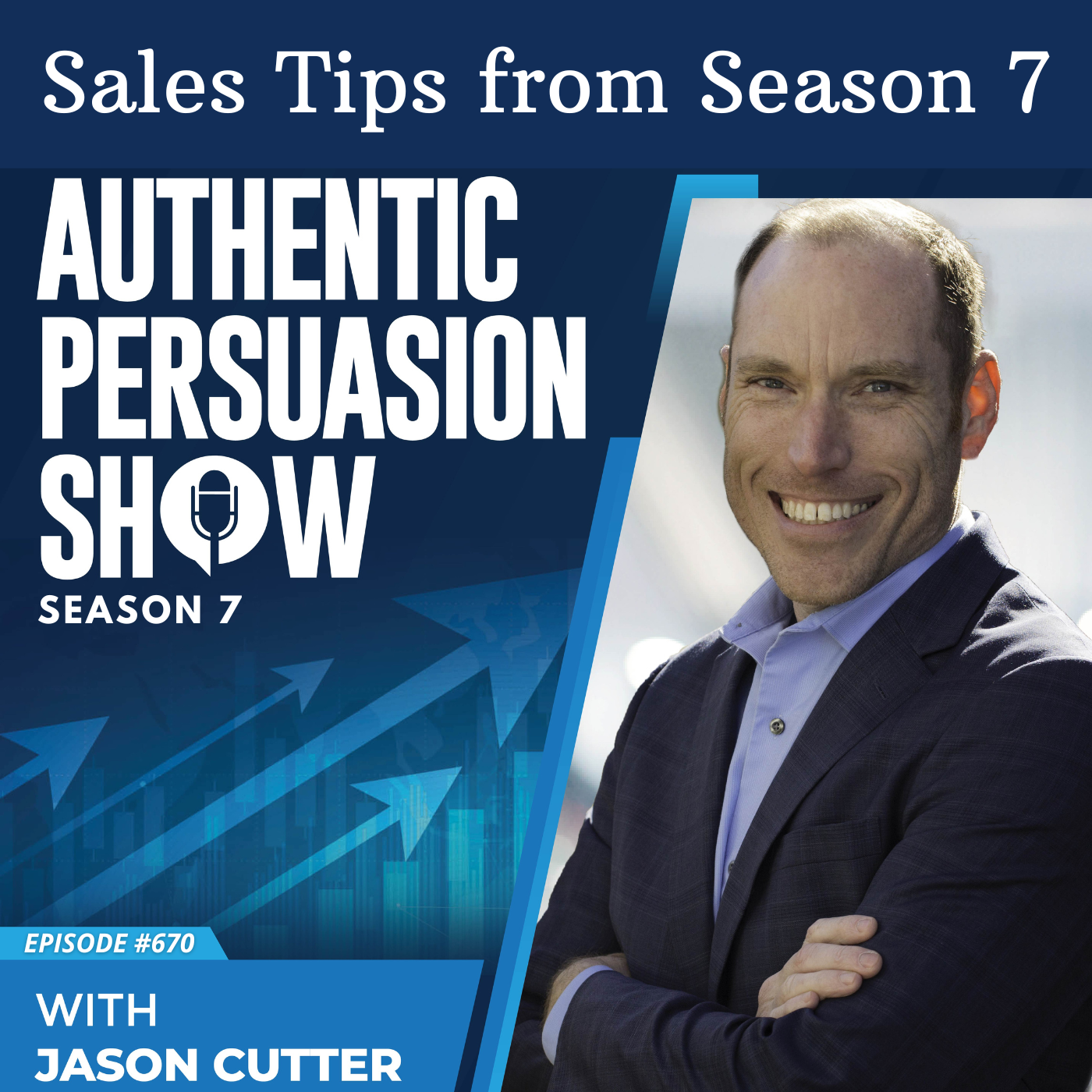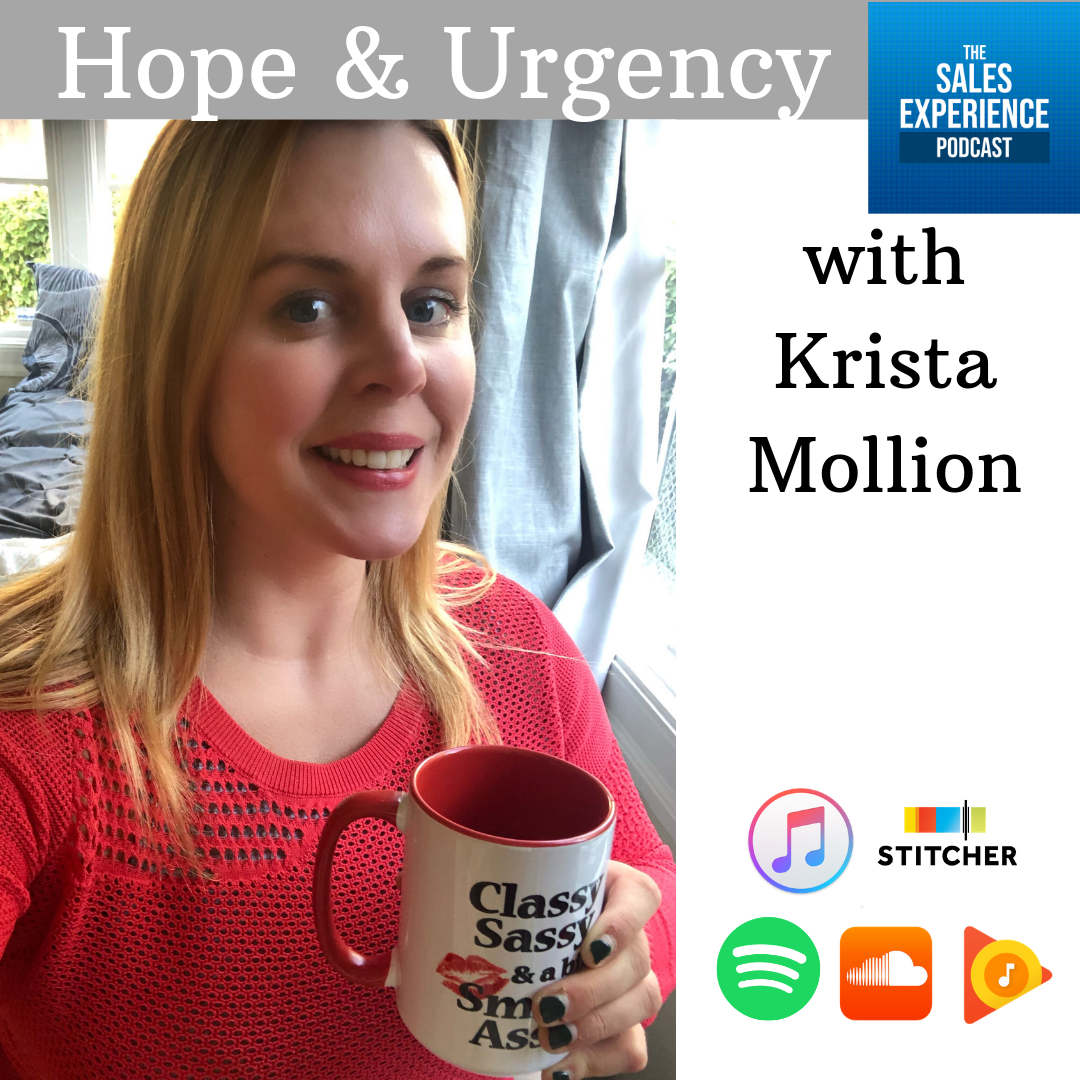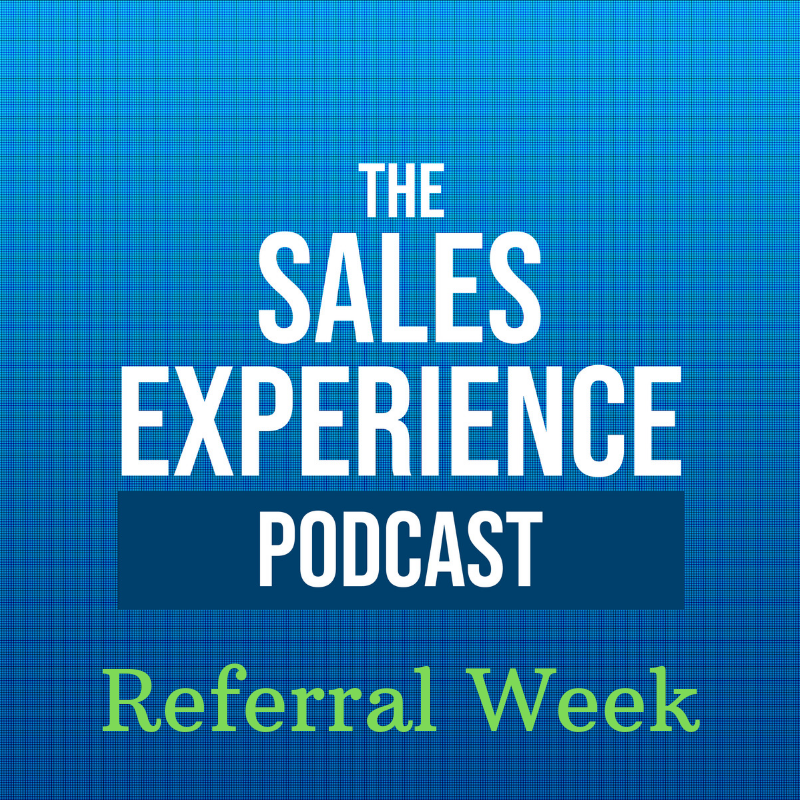Episode Transcript
Welcome to the sales experience podcast. My name again is Jason Cutter. So glad that you're here and you're joining me. This is episode 290, which is crazy in my mind. When I think about the fact that my initial goal was a hundred episodes and here we are approaching 300. Now for today's topic, I want to talk about something.
That is now becoming a common complaint that I'm hearing from a lot of my consulting and coaching clients, and it's that their potential buyers are ghosting them. Now, in case you're unfamiliar with that term, ghosting is when someone disappears, like a ghost. They're one moment, you can see them, maybe even try to communicate with them, then poof, they're gone.
And it's a term that's used a lot in dating situations, where it seems like things are going well, there's chatting, there's flirting, maybe even going out on a date or two. And then, poof, they stop responding to calls, texts, emails, notes, letters, sitting in front of their house, banging on their door.
Whatever your courtship style is, it just doesn't seem to work. They stop responding, and there's pretty much nothing you can do except cross the line into creepy stalker mode. Now, if you've heard me speak before, then you know that I do a lot of comparisons between courtship And selling moving someone forward to agreeing to a date and then being in a relationship with you will usually mirror the same way that you would successfully move someone from being an unknown lead to a prospective buyer to a customer, right?
Closing the deal. At whatever stage you're at is going to mirror those same things. So ghosting, when it comes to a situation that involves some level of selling and buying means that the prospective customer disappears, stops responding to emails or phone calls. So let's talk about why this happens. The first reason why this can happen is fear.
Your prospect is afraid. What are they afraid of? They're afraid of change. Why are they afraid of change? Because change could lead to failure, to embarrassment, to looking bad, to making a mistake. And in our brains, in that primal part that you know that I've talked about before, that we all have, your prospects in particular are afraid of.
Change. They're afraid of making mistake. They're afraid of picking the wrong thing. That's why so many people are, attached to the brand of paper towels or toilet paper or dish soap or clothes. It's a known entity. Anything outside of that could lead to failure. And literally, people buy the same paper towels because they don't want to try something else, even if there's possibly something better.
And your prospective customers Could ghost you because they're just afraid of change. Second reason it's about their priorities, meaning that whatever you're selling, whatever you're hoping to persuade them to buy is just not important enough in their list of priorities in their life. It's just not that important because we all know if it's something is important enough, we will make it work.
We will find a way. We will find the money. We will find the time. And this is what I see a lot where people tell me I just don't have the time for that. No, it's just not important enough because if it's important enough, you'll find the time. If it's important enough, you'll find the money. And it just means that if they've ghosted you, one of the reasons could be is that you haven't helped them identify this as a priority or it's just not a priority.
And really what happens is you failed to mitigate these two things. So you got to focus on helping them feel safe, which is an acronym I use. Successful at fear. Elimination. Your job is to help them feel safe enough for them to tolerate change and buy from you, right? That's your number one goal is to help them feel safe.
And you do that by being successful at fear. Elimination. The second part. is when we're talking about priorities is that you've got to understand their priorities and needs at the deepest level. And maybe there's a lot of times where you didn't even get to the point where you could ask them questions and dive deep.
That happens a lot with online inquiries, like where people fill out contact web forms and then they never actually respond. So it seems like it's a hot lead and then you never talk to them. So that happens a lot. But if you did speak with them, Were you on the surface level with them with your questions and as a salesperson or did you dive deep in trying to find out where their biggest needs are, their wants, their desires, their pain, whatever it is that you're selling and what it accomplishes?
And then, how does that fit in with their priorities? Is it a small, painful thing, right? Is it a splinter in their hand? Or is it a gunshot wound type pain that they need solved, right? Those are different levels of priority. That may seem graphic and dramatic, but it's true. When somebody has a gunshot wound type of problem they want solved, it doesn't matter.
They will get it fixed. If it's just a splinter. It's a little painful. It's a little annoying, but whatever. There's bigger things to deal with in life. And speaking of which, you can also just say that maybe life got in the way, capital L, life got in the way, which definitely happens no matter what, especially these days, right?
We have the pandemic. We have people working from home. Now many people have to manage their kids all day. while trying to work. So they're a teacher, their parents, and they're trying to juggle it all. If you're on the west coast, like I am, you're dealing with crazy fires everywhere and everything that's going on.
So there's a lot, there's a lot happening for pretty much everybody. And for whatever you're selling, there is a point where no matter how good you are at discovery with uncovering pain, with pointing out the benefits for all of that. It's possible the prospect's life is just clearly overshadowing it. So sometimes that happens as well, no matter how good you are, you're just not going to win that battle against life.
Now, let's shift and talk about what you can do about it. Your prospect has ghosted you, they're not contacting you at all. You want to reach out to them or you think it's a good fit or it's somebody you've qualified and you know that you know that you could help them and you could sell them.
Now what do you do? Now, of course, the first best thing is prevention. Prevention is always the best medicine. But if we're at this point, you've been ghosted. Here is my common advice. First, if you're selling to businesses or employees of businesses, then go onto LinkedIn and try to connect with your prospective customer on there, send them a customized connection request and don't try to sell them anything right away.
Your goal is to just start a conversation. It's to connect with them. It's to hopefully pop up back on their mental radar. So that you can resume the sales process and conversation, especially if you haven't qualified them. So you can see if they're a good fit or not. If you have qualified them and it's a good fit, then hopefully you can move forward.
Now, if you sell direct to consumer, don't be creepy online, right? Don't try to find some on Facebook, Instagram. It's the same thing. If we go back to that courtship and somebody goes to you and they're not responding to your emails and your messages and your candy grams or whatever you're doing.
Finding someone online and then stalking them online is not going to help your situation. It's not going to help you close the deal. So LinkedIn is good because everyone is on LinkedIn for business. That's what they're expecting. And that's totally professional. If it's business to business, if you're selling direct to consumer, you're probably not going to be able to go online and have it not be creepy.
So second one, when you call or email, so this is in your follow ups, make it about them. I see so many times where people call and they're just talking about themselves, like the salesperson is talking about them, their business, what they think the value is instead in your messages, make it about the prospect, their issue, their situation, or their goal.
Use whatever information you got from them initially in your conversations and tie in their why they would want your product or service and why they should call you back or email you back for their reasons. Not for yours, not for some end of month special, not for some, whatever your reasons might be.
And what you think they are, always tie it back to them. Always make it about their situation. If you know what their pain point was, say, Hey, I just following up with you really want to take care of that situation you had with X, Y, and Z. I know that be able to help you. Let's talk again. Let me know when you have five minutes so we can chat.
On that note, which is just a completely side note, when you do call, when you do email, a lot of times, because everyone is so busy and overwhelmed, like that's the other theme that I see a lot, and everyone just feels busy and overwhelmed, is that if you want to have a call, if you want to have a conversation with somebody, just make it really easy, make it, hey, when do you have five minutes so we can just catch up?
I would love your feedback and just let me know your feedback we talked about before and let's just get on the phone for a couple of minutes. Make it seem easy. Make it seem quick. The last thing I know that anybody who's ghosting you wants right now is a 30 minute zoom call or a conference call or a long phone call or the chance that they might get roped into some long sales pitch or demo.
So just make it quick. Your goal is to get them out. The pattern interrupt. Get them back into buying mode with you and then just continue the conversation. If you can steal two, three, five minutes now and then set something up, hey, at least you've gotten some progress out of it. Third thing, always remember, don't chase.
It makes you look desperate. Think about the courtship scenario again. What if someone wanted to date you and they sent you an email every day and called you and left you a message every day and sent you text every day, like every once in a while, I don't know how, but I end up on some B2B SAS companies radar that I don't remember signing up for.
And I literally get those calls. They're like super chasing me daily. Don't do that. Know your proper outbound cadence. Have a line in the sand where you know you're going to stop now on that note. One of the things I recommend is you always have somewhere at the end of your sequence, a breakup message or email, something like, Hey, if you're no longer interested, let me know.
And I can close out your file or whatever it is. It works so well and not in a pure takeaway, but just leave that option open because some people say, Oh, you're right. I do want the help or maybe they don't want the help, but it's always good to do that. And then mean it. Hey, I don't think this is a good fit.
Maybe we should break up. Don't keep getting roped into chasing that person. Cause it's just not gonna work. And it's not gonna work long term. Always remember the goal for you is to get them to say yes. No, or yeah, but. Yes is great. Done deal. Swipe the credit card. We're done, right? No, especially if you've done your job and you've done your best to overcome all their objections and you've handled it like a professional is also great because at least you know it's over, right?
That will help you to stop chasing, stalking, wondering, worrying. All of that. They said, no, they don't want to buy from you or in dating. They don't want to date you. Now you can go through the remaining stages of grief and then move on with your life. Yeah. But it's also good because that is where a sales professional wants to be.
And that's your value in the transaction. That's where you overcome objections, work with your prospect to get them to yes, and help them cross the finish line. As a professional. So that's what you want. Your goal, pattern interrupt, get them to break the cycle of avoiding you and give you one of those three determinations.
Hope that helps with your ghosting experiences. Hopefully you can pull some people back into the normal reality, pull them back out of the ghost realm, get them moving forward in your sales process. That's it for this episode. I'll see you on the next episode of the sales experience podcast. That's it for another episode of the sales experience podcast.
Thank you so much for listening. If you find yourself on iTunes, can you leave the show a rating and a review? It helps other sales people and sales leaders find the show and please subscribe to the show and share episodes you find valuable with anyone you know in sales. Help me on my mission of changing the way sales is done.
And if you're ready to work together, go to Jason cutter. com. Again, that's Jason cutter. com. To find out how I can help you or your company create scalable sales success. I will see you on the next sales experience podcast episode, and keep in mind that everything in life is sales and people will remember the experience you gave them.
![[E290] Getting Ghosted](https://episodes.castos.com/salesexperiencepodcast/images/Season-3-TSEP-Covers-4.png)


